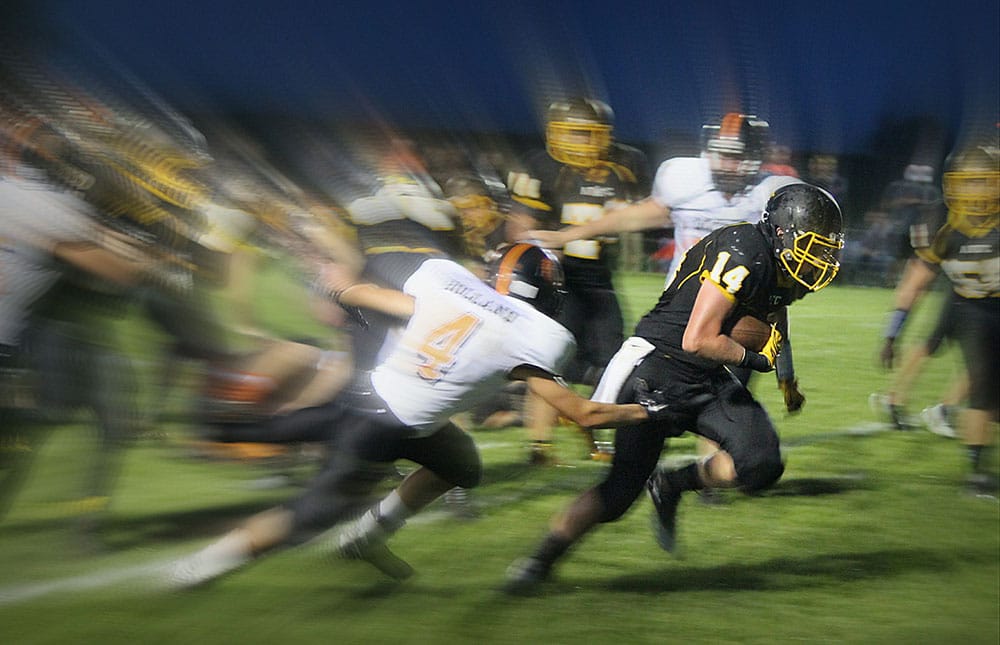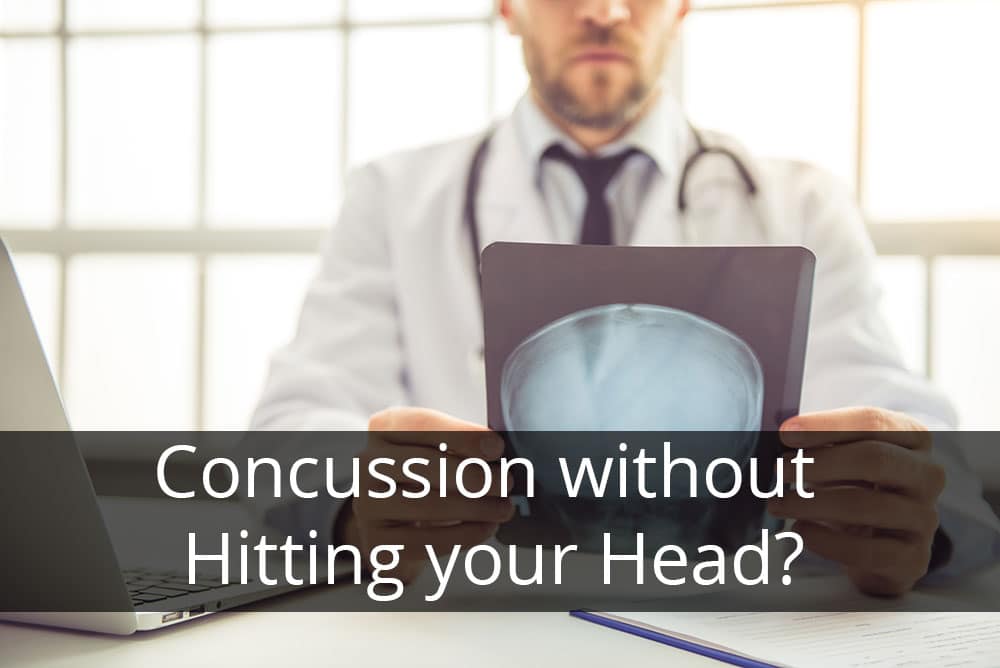A concussion is defined by the Centers for Disease Control and Prevention as “a type of traumatic brain injury […] caused by a bump, blow, or jolt to the head or by a hit to the body that causes the head and brain to move rapidly back and forth.” Concussions are also known as mild traumatic brain injuries, or mTBIs.
With this definition in mind, it may surprise you to hear it is quite possible to sustain a concussion without actually hitting your head.
Often concussions are caused through heavy contact sports such as football, hockey, rugby, and even soccer. Concussions also occur through other means, such as car crashes and auto accidents. In some cases, you may not even know you’ve sustained a concussion. Other times, you may feel symptoms such as dizziness, nausea, headaches, or in severe cases, you may even pass out.
How do you get a concussion?
You can sustain a concussion in a variety of ways. High-contact sports are where most concussions occur, and a study done by MedStar health over 11 years found that the most youth sports concussions occurred in men’s football and lacrosse. Sports like these often involve bodily contact and an emphasis on tackling and running.
However, non-sports concussions can happen in high-impact accidents.
Many of these incidents occur during automobile accidents. Overall, approximately 5.3 million people in the United States live with concussion-related disabilities.

Getting a concussion after falling
Sometimes, a person may fall and have a headache after falling, but they didn’t necessarily hit their head during the fall. You may think, “I couldn’t have a concussion,” but as we discussed, this is still entirely possible.
Because your brain is a gelatinous mass, any violent jostling to your head and upper body can actually cause it to move around. Falling can trigger headaches and even produce concussions if the movement is violent enough.
Headaches after falling aren’t necessarily a sign of a concussion, so you need to be careful to monitor yourself for possible symptoms after.
These symptoms include the following:
- Prolonged headaches or headaches days after falling
- Ringing in the ears
- Nausea
- Vomiting
- Extreme fatigue or drowsiness
- Blurred vision
More severe symptoms include
- Confusion
- Feeling like you’re in a fog
- Memory loss about events surrounding the event
- Dizziness or “seeing starsâ€
Can you get a concussion without a bump?
As stated previously, it is entirely possible to get a concussion without actually hitting your head.
Therefore, you are able to get one without actually having any physical bumps on your head. Though the skull protects the brain, it is not really attached to anything inside the skull. Rather it floats suspended in a substance made mostly of fat.
In fact, your brain is 60% fat, and the other 40% is water, protein, carbohydrates, and salts. Your brain, then, has an almost jelly-like texture. Unlike what you see in models, the brain is not hard, and would be impossible to pick up without chemical preservation.
What happens after you get a concussion?
Symptoms and effects vary between people.
However, there can be some lasting effects of severe concussions. These effects, as described by Mayo Clinic, are called “persistent post-concussive symptomsâ€.
Persistent post-concussive symptoms occur “when concussion symptoms last beyond the expected recovery period after the initial injury.” Symptoms of this type usually show up around seven to ten days after the initial concussion.
However, for some people, symptoms can occur years after the accident.
These symptoms are similar to the ones that may occur directly after a concussion, and commonly include:
- Dizziness
- Fatigue
- Blurry vision
- Ringing in the ears
Some symptoms, however, are unique. These include such symptoms as:
- Irritability
- Anxiety
- Insomnia
- Difficulty concentrating
- Memory loss
- Noise and/or light sensitivity
Persistent post-concussive symptoms often manifest themselves as tension headache. Neck soreness may also accompany them.
Although experts aren’t sure exactly what causes persistent post-concussive symptoms, some research indicates they are the result of long-term damage or disruption within the nerve pathways of the brain. Others cite psychological factors.
How hard do you have to hit your head to get a concussion?
According to a study done at Michigan University, a concussion occurs when the head sustains approximately 90-100 g-force. For reference, that is equivalent to something hitting your head at 20 miles per hour.
However, concussions aren’t always caused by blunt-force trauma and sometimes occur in other ways, particularly in car crashes.
Although it may seem that a harder hit to the head would produce a more severe concussion, research by Dr Steven Broglio shows that the force of the blow does not necessarily produce a more severe injury.
Even though you don’t need to hit your head to sustain a concussion, many concussion-like symptoms may produce a feeling like you did. If it feels like you hit your head, but you didn’t, it’s crucial to note that if you sustained violent back and forth shaking of your upper body, the same feeling may be produced.
Can you get a concussion from whiplash?
Car crashes are a primary proponent of concussions. Whiplash is the major player in giving automobile crash victims these troublesome injuries. Whiplash occurs when a person’s neck is thrown back and forth in a whiplike fashion. Although whiplash usually occurs during car accidents, other situations such as sports, physical abuse, or falling can produce whiplash.
Since the violent back and forth movement causes the head — and therefore, the brain — to experience the same thing, concussions regularly occur alongside whiplash.
We see this most often in rear-end vehicle accidents. These accidents most often happen at red lights, but if a driver is engaging in “brake checking,” that could lead to an accident as well. Depending on where you live, this could be illegal.
Concussion and whiplash symptoms often are similar, so you’ll want to make sure to get an evaluation from a doctor to determine whether you got a concussion or not.
In addition to getting a concussion, many automobile accidents can produce painful neck and head injuries.
Even if these do not produce a concussion, it’s pivotal to know what to do after these injuries and know when to search for a doctor and get help.

Concussions after a Car Wreck
Car accidents may cause concussions through whiplash, but it’s also possible the actual hitting of your head on the inside surface of the car could produce one. Years of research on concussions show the devastating effects of these traumatic brain injuries.
Although it’s unlikely the average person will sustain repeated concussions within their lifetimes, studies show that repeated head traumas can bring about a certain disease called chronic traumatic encephalopathy (CTE).
CTE is an incurable neurodegenerative brain disease that can onset as early as 40s for some. The disease progresses quickly and often manifests itself through aggressive and violent behavior.
In addition, concussions after a car wreck may lead to long-term effects due to the way they impact your immediate wellbeing. Because some people can’t remember the events surrounding the accident, they may present faulty witness evidence in the case of a legal battle. Those who suffer concussions or other bodily injury can be liable for insurance claims.
With this in mind, it’s crucial to know what to do after an automobile accident. If you are able to, the first step after an accident is assessing the situation and then calling authorities. If you believe that others are injured, emphasize that to the dispatcher.
If you believe that you yourself are injured, then try and stay calm, remain in the vehicle if safe, and if you can, try to call or motion for help. If you experience symptoms related to concussions or another injury, then be sure to go to your doctor.
At-risk Groups and other Concussion Effects
Most concussions do not produce long-lasting results, and most people are able to live normal lives after experiencing them.
However, if you experience symptoms similar to persistent post-concussive symptoms, then be sure to contact your doctor. In addition, long-term concussive symptoms can be influenced by emotional factors.
Older people and those with prior head injuries are at risk for post-concussive complications. Young children whose heads aren’t fully developed also have an increased risk of concussions. Symptoms in children are similar to those in adults, but may manifest differently.
If your child hit their head or also was involved in an automobile accident, then look for concussion symptoms such as:
- Dazed appearance
- Tiring easily/lack of energy
- Unsteady walking
- Irritability
- Lack of interest in toys
- Vomiting
- Seizures
Contact Stoy Law Group
If you or a loved one experienced any sort of personal injury, including concussions and bodily harm during a car wreck, then it’s also important to contact experienced personal injury lawyers to deal with the aftermath of an accident.
Specific automobile accident lawyers are trained to deal with these cases and help individuals get compensation for their injuries and accidents. Not only that but legal jargon and rules can be tricky to navigate and puzzle out, especially after a traumatic event like a car accident.
Don’t hesitate to reach out to our lawyers online or other means to help you bounce back from an accident.














